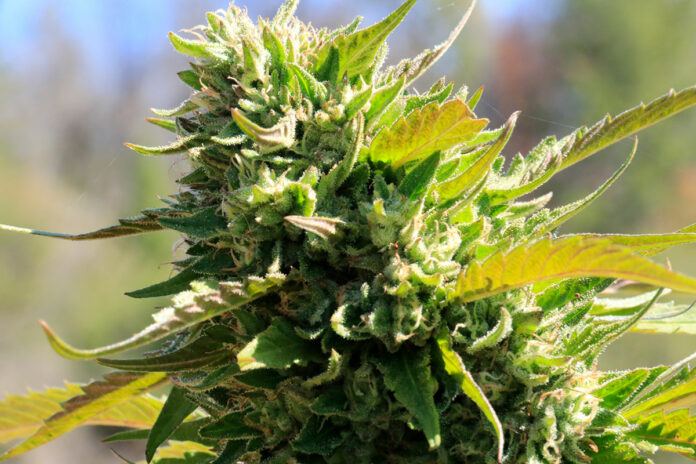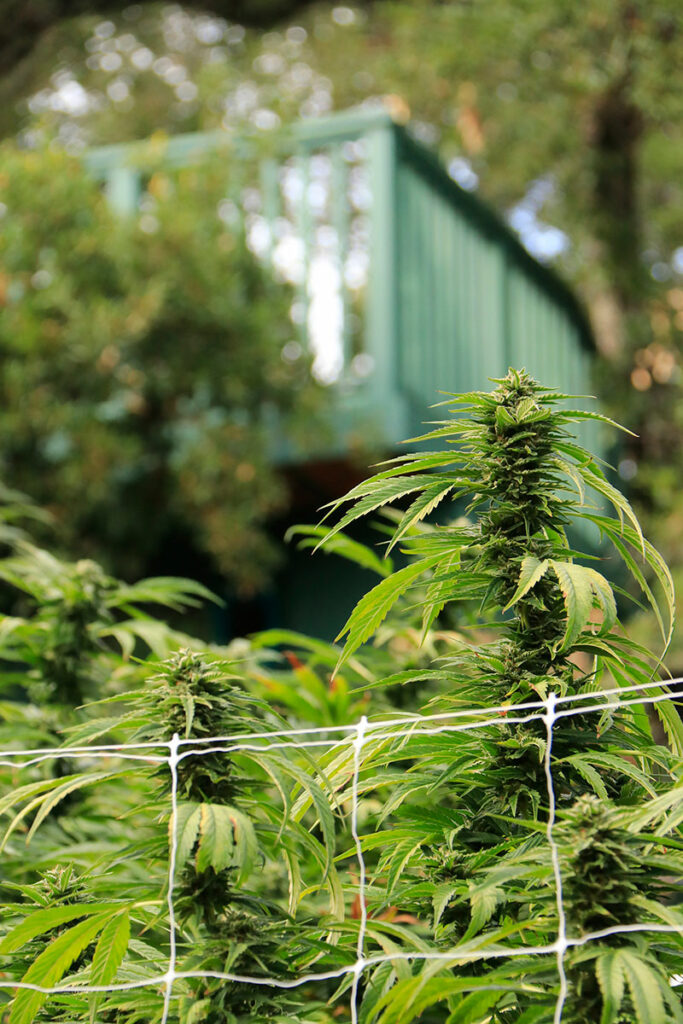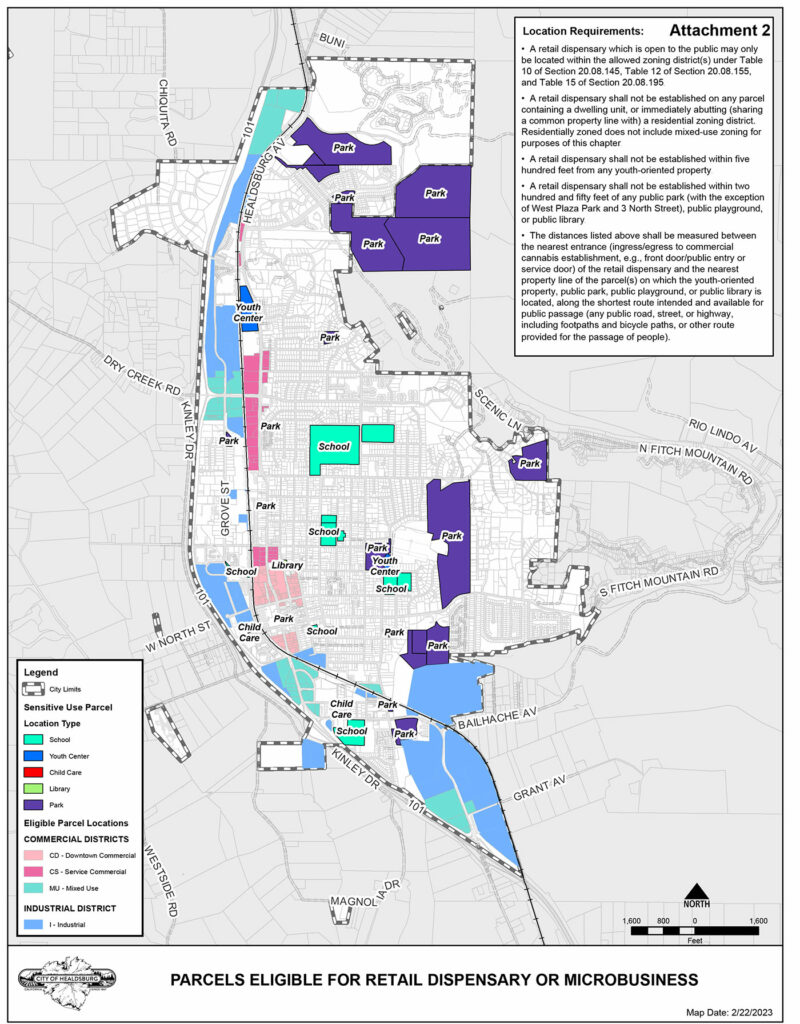
The City of Healdsburg began accepting applications for cannabis businesses last week, including up to two retail cannabis businesses—dispensaries by another name—in a complicated multistep process that nonetheless is expected to attract 10 or more applicants.
It’s part of the city’s effort to join the cannabis movement, after declining to do so following state legalization under Prop. 64 in 2016. But last year, the city council began moving toward opening the door to legal cannabis business in town. And in April 2023, the council adopted a comprehensive cannabis policy and a competitive process for business licenses which could lead to two retail dispensaries that might receive permits.
Revenue that could result from permitted cannabis business is often a factor in a jurisdiction’s decision-making process. Several taxes are imposed on cannabis businesses by the state; to them Healdsburg adds a 4% retail tax surcharge, except for medical marijuana purchases.
The application process is now underway. The application period opened last Thursday, June 15, and will remain open for 45 days, until Sunday, July 30, at 4pm.

All information, including the application form itself, is available on the city’s website at Healdsburg.gov/cannabis. And the applications themselves will only be accepted online through the secure portal at that page.
The application process and evaluation is overseen by HdL Companies, the revenue services contractor hired to oversee the application process. To date, HdL has assisted 175 cities and counties in California with development of cannabis regulatory programs, helping with application review in 63.
They’ve served in that role for three other cities in the county—Sonoma, Cotati and Cloverdale. Their service fee to the city is projected to be $82,000.
Similar to the process in those other jurisdictions, applicants must submit a number of documents, including a business permit application, property owner consent, zoning clearance letter, a criminal background check request form and an agreement with the city. The comprehensive background check is conducted by HdL.
The application includes a fee of $9,647 for review and processing; additional fees may be required or requested by the city during the process. While this may seem high, it’s in line with process fees charged in other cities in the area—more than Cloverdale ($5,182) or Cotati ($6,943), less than Santa Rosa ($13,991) and roughly on par with Sonoma ($9,797).
Location, Location
The issue of location for a retail cannabis operation is always fraught, as residents and community groups are usually cool to introducing cannabis to their neighborhoods. The lengthy process of drawing the map of approved zones for a cannabis business resulted in a final map available on the city’s cannabis portal at healdsburg.gov/cannabis.
While most of the city’s commercial zones are included in the permitted area, excluded are locations 500 feet from schools, youth centers and child care facilities, or 250 feet from public parks and libraries.
That distance is not measured by radius, but walking distance “along the shortest route intended and available for public passage,” a method also endorsed by the council.
Although the zoning restrictions forbid a business closer than 250 feet from a public park, the council decided to exclude West Plaza Park from that prohibition. The city’s central Plaza Park is included, to forbid cannabis business from opening in the core plaza area.
With residential zones also excluded, the areas where cannabis operations can open are limited to a patchwork of pink and blue jenga blocks on the city map, also available at the Healdsburg.gov/cannabis portal.
For whatever location is preferred, the applicant needs to apply for and receive a Zoning Clearance Letter from the city, which costs an additional $113 for processing and review. There may be an unlimited number of applications per location, but only one retail applicant will be issued a retail permit per location.

The revisions to the city’s municipal code that were adopted by the city council in April 2023 allow retail dispensaries and microbusinesses to locate in the Downtown Commercial (CD), Service Commercial (CS), Mixed Use (MU) and Industrial (I) zoning districts.
Microbusinesses are a single operation that include at least three cannabis business activities, such as retail, manufacturing and distribution. Standalone cannabis manufacturing, distribution and testing uses are allowed in the Industrial (I) district only. No commercial cannabis businesses are allowed within the Plaza Retail (PR) zoning district.
“The City’s current focus is on the application process for the two retail dispensaries,” said Assistant City Manager Andrew Sturmfels. “Although the land use code does now allow them, we have not received any interest in establishing a lab testing, manufacturing, or distribution business in town.”
Commercial cultivation of cannabis is not allowed by the new ordinances, but since limited personal medical cultivation is permitted by the state, the City of Healdsburg allows up to three outdoor plants and no more than six plants indoors, subject to structural review.
Scoring and Review
The bulk of the information solicited in the application, which can be up to 125 pages long, covers such topics as a business plan, labor and employment plan, and a security plan, all of which will be scored by the city and HdL.
The application itself is worth up to 1,200 points of a possible 2,800 points. The other 1,600 points are scored during an interview process that covers the qualifications of the owners, neighborhood compatibility, community benefits and equity pay, and the proposed site plan.
Background checks for the owners and manager are required, and “proof of capitalization” and other business documents.
The applications will be reviewed for completeness by HdL and city staff, and most applicants are expected to move on to the interview phase. Hour-long interviews will then be held with each applicant, conducted again by HdL consultants and staff, with up to five such interviews on successive days, broken by a half-hour evaluation period.
When the scoring process is completed, a report of the applicants is presented to city staff. The council will review and hear from the top applicants at a “properly noticed public hearing,” not expected until September or later.
The final decision as to the business or businesses that will be approved is up to the City Council, and, according to the passed ordinance, “Any decision made by the City Council during Phase IV to award or not to award a cannabis permit shall be final and shall not be subject to appeal.”







